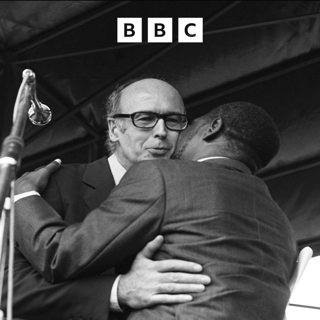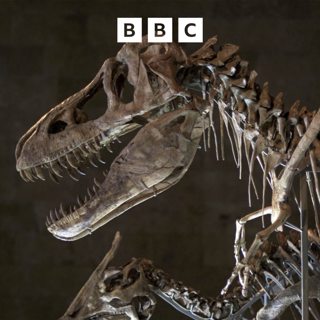
Nazi eugenics and the year of the vuvuzela
Max Pearson presents a collection of this week’s Witness History episodes from the BBC World Service.We hear about the people with disabilities who were sterilised in Germany following an order in 1933, passed by the then Chancellor Adolf Hitler.Also, we find out about the first man to descend into the “Gates of Hell”, the Darvaza Crater, in Turkmenistan.Plus the story behind the vuvuzela which was dubbed the “world’s most annoying instrument”.Contributors: Helga Gross who was sterilised in Germany as part of the Nazis’ eugenics order. This is an archive interview from the United States Holocaust Memorial Museum. Dr Susanne Klausen, Julia Gregg Brill Professor of Women's, Gender and Sexuality Studies at the Pennsylvania State University. Campaigner Emma Bonino who fought for legal abortion in Italy. Explorer George Kourounis who was the first person to descend into the Darvaza Crater, in Turkmenistan. Paramedic Daniel Ouma who helped people injured in the Westgate Mall terror attack, in Nairobi, in Kenya, in 2013. Freddie 'Saddam' Maake who claims to have invented the vuvuzela.(Photo: Adolf Hitler. Credit: Gamma-Keystone via Getty Images)
22 Sep 202351min

Israeli and Palestinian history
Max Pearson presents a collection of this week's Witness History episodes from the BBC World Service. It's thirty years since the Oslo Accords were signed. This agreement in 1993 aimed to bring about peace between the Israelis and Palestinians. So this week, we're bringing you stories from Israeli and Palestinian history. We hear about attempts at peace - the secret talks behind the Oslo Accords, and President Bill Clinton's failed attempt to end the conflict at Camp David. Plus, one of the most dramatic sieges of the Israeli-Palestinian conflict that took place in a church. We also hear from a Palestinian and an Israeli who were there when rioting broke out in 2000, after the Israeli opposition leader, Ariel Sharon, made a visit to the al-Aqsa Mosque compound. And finally a hope of peace with the orchestra, made up of young people from both sides of the conflict, which performed a concert in the Palestinian city of Ramallah.Contributors: Mona Juul – Norwegian diplomat who was part of the team that planned and orchestrated the meetings which resulted in the signing of the Oslo Accords. Yolande Knell - Middle East Correspondent for BBC News. Gamal Helal - American diplomatic interpreter and policy adviser. Khaled Zeghari - Palestinian cameraman. Zalman Shoval - former Israeli ambassador to Washington. Carolyn Cole - photojournalist. Father Amjad Sabbara - Franciscan friar. Tyme Khelefi - former violinist with the West-Eastern Divan orchestra. Daniel Cohen - former violinist with the West-Eastern Divan orchestra.(Photo: Israeli soldiers run towards the Church of the Nativity. Credit: Musa Al-Shaer/AFP via Getty Images)
15 Sep 202351min

The Chilean coup and Zanzibar’s most famous singer
Max Pearson presents a collection of this week's Witness History episodes from the BBC World Service. We hear from Chilean politician Hermógenes Pérez de Arce, who helped oust President Allende in 1973. We also hear from the widow of folk singer Victor Jara, who was killed during the military coup.Our guest is Dr Camila Vergara, who is a historian and journalist from Chile, and a senior lecturer at the University of Essex Business School in the UK. She tells us more about the aftermath of the Chilean coup, and its lasting impact.Eva Franchell speaks about her friend, the Swedish foreign minister Anna Lindh who was murdered in 2003.In the second half of the programme, campaigner Frank Heweston shares his experience on Greenpeace’s Arctic voyage to disrupt drilling on a newly built oil rig and we hear from a friend and promoter of Zanzibar’s most famous musician, Bi Kidude. Contributors: Camila Vergara - historian and journalist from Chile, and senior lecturer at the University of Essex Business School. Hermógenes Pérez de Arce – Chilean politician. Joan Jara – widow of Victor Jara. Eva Franchell – Anna Lindh’s former press secretary and best friend. Maryam Hamdani - friend and promoter of Bi Kidude.(Photo: President Salvador Allende. Credit: Bettman/Getty Images)
9 Sep 202351min

Historic Korean summit and goat island
Max Pearson presents a collection of this week's Witness History episodes from the BBC World Service. Our guest is Jean H. Lee, an American journalist who has covered both North and South Korea extensively. Jean is also the co-host of the BBC World Service podcast, The Lazarus Heist. She tells us more about the relationship between the two countries.The programme begins with the historic meeting between North and South Korea's leaders almost 50 years after the Korean War. We hear from Sameh Elbarky who was in Cairo's Rabaa al-Adawiya Square on the day the army killed hundreds of protestors following a military coup. In the second half of the programme, British black activists recount how they protested against racism within the local bus company in Bristol in 1963. One of the first Chinese students to arrive in the US in the early 1980s following the Cultural Revolution shares her experience. Finally, how the Mexican island of Guadalupe was saved from being destroyed by hungry goats. Contributors: Jean H. Lee - American journalist and the co-host of the BBC's The Lazarus Heist podcast. Professor Chung-in Moon - South Korean special delegate. Sameh Elbarky - survivor of the Rabaa massacre. Paul Stephenson - spokesperson for the Bristol Bus Boycott. Roy Hackett - Bristol Bus Boycott protestor. Zha Jianying - Chinese American writer. Professor Exequiel Ezcurra - conservationist. (Photo: North and South Korean leaders meet at the summit in 2000. Credit: Reuters)
1 Sep 202350min

Ireland's 'ghost estates' and the first Rose of Tralee
Max Pearson presents a collection of Witness History stories from the BBC World Service, this week we are focusing on Irish history. In 2006, Ireland’s economic boom, known as the Celtic Tiger, ended. It meant thousands of people, like Michelle Burke, were left devastated as house construction stopped. In 1959, Tralee, in Ireland, hosted a festival to promote the town and build Irish connections around the world. The Rose of Tralee is now one of Ireland’s oldest and largest festivals. Veteran RTE broadcaster and author, Joe Duffy, walks us through the significance of the Celtic Tiger. At Easter 1916, a small army of Irish rebels attempted to start a revolution against British rule. They held out for more than a week against a massive British military response, but the insurrection ultimately failed. Also, how electrification lit up rural Ireland for the first time, despite concerns about its potential dangers. And how a group of women fought against a sexist tradition, that prevented them from taking a dip in a popular swimming spot. Contributors: Michelle Burke - lived through the Celtic Tiger boom and bust. Alice O’Sullivan - first Rose of Tralee winner. Joe Duffy - broadcaster and author. Mary Dorcey - poet, writer and women’s rights activist.(Photo: Deserted 'ghost estate' in Ireland. Credit: Tim Graham/Getty Images)
25 Aug 202350min

Judy Garland's legacy and the Benin Bronzes
A compilation of this week's Witness History episodes. Gerald Clarke, the author of Get Happy: The Life of Judy Garland, speaks to Max Pearson about the legacy of the stage and screen actress who died in 1969.We also look at how a chance encounter led to the return of two of the looted Benin Bronzes, ancient artworks which were among thousands stolen from Benin City by the British Army in 1897.And we head back to 2008, when a nine-year-old boy tripped over a fossil that would lead to one of the most important discoveries in the history of human evolution.Contributors:Author Gerald Clarke John Kelsch from the Judy Garland Museum Production assistant Rosalyn Wilder Retired police officer Tim Awoyemi Matt Berger who discovered the Australopithecus sediba fossil Hedayat Matine-Daftary, grandson of Mohammed Mossadeq(Photo: Judy Garland during a press conference in 1963. Credit: Central Press/Getty Images)
18 Aug 202352min

Presidential diamonds and Tupperware parties
Max Pearson presents a collection of this week’s Witness History stories from the BBC World Service. Journalist Claude Angeli discovered French President Valéry Giscard d'Estaing received diamonds from a depraved African emperor, which contributed to him losing the presidential election in 1981. How Bosnia’s small Jewish community helped people from all sides of the conflict, during the siege of Sarajevo in the early 1990s. The story of the gang of thieves, who held up a British Royal Mail train on its journey from Glasgow to London in August 1963. Plus Jean-Michel Basquiat, a young black graffiti artist in the 1980s took the New York art world by storm. His paintings were selling for huge sums of money, but he died before the end of the decade. And the rise and fall of self-made businesswoman Brownie Wise, who inspired an army of US housewives to sell Tupperware at parties. Contributors: Journalist Claude Angeli Journalist Pauline Bock Former vice president of the Jewish community Jakob Finci Author Bob Kealing Journalist Reginald Abbiss Patti Astor, friend of Jean-Michel Basquiat(Photo: French President Valery Giscard d'Estaing and Jean-Bédel Bokassa in Bangui, March 1975. Credit: Getty Images)
11 Aug 202350min

Dinosaur discoveries and a Berlin Wall treehouse
Max Pearson presents a collection of this week’s Witness History episodes from the BBC World Service. We hear about a prehistoric discovery in India - a nest full of dinosaur eggs found in 1982. Plus, why a Mongolian dinosaur skeleton became the centre of a 2012 court battle in a case known as United States V One Tyrannosaurus Bataar.Our guest, palaeobiologist Neil Gostling reveals how newly-uncovered dinosaurs are named, and tells us which fossilised beast was the first to be christened.José Mujica recounts his journey from young revolutionary in the 1960s and 70s to becoming Uruguay's president in 2009. Plus, we learn more about the deaf children in Nicaragua who invented their own sign language. And find out why a treehouse built beside the Berlin Wall during the Cold War became a symbol of resistance.Contributors: Professor Ashok Sahni - palaeontologist Associate Professor Neil Gostling - palaeobiologist Dr Bolortsetseg Minjin - paleontologist José Mujica - former president of Uruguay Professor Judy Shepard-Kegl - linguist Mehmet Kahlin – son of Osman Kahlin(Photo: Tyrannosaurus Bataar skeleton, 2016. Credit: Johannes Eisele/AFP via Getty Images)
5 Aug 202351min





















